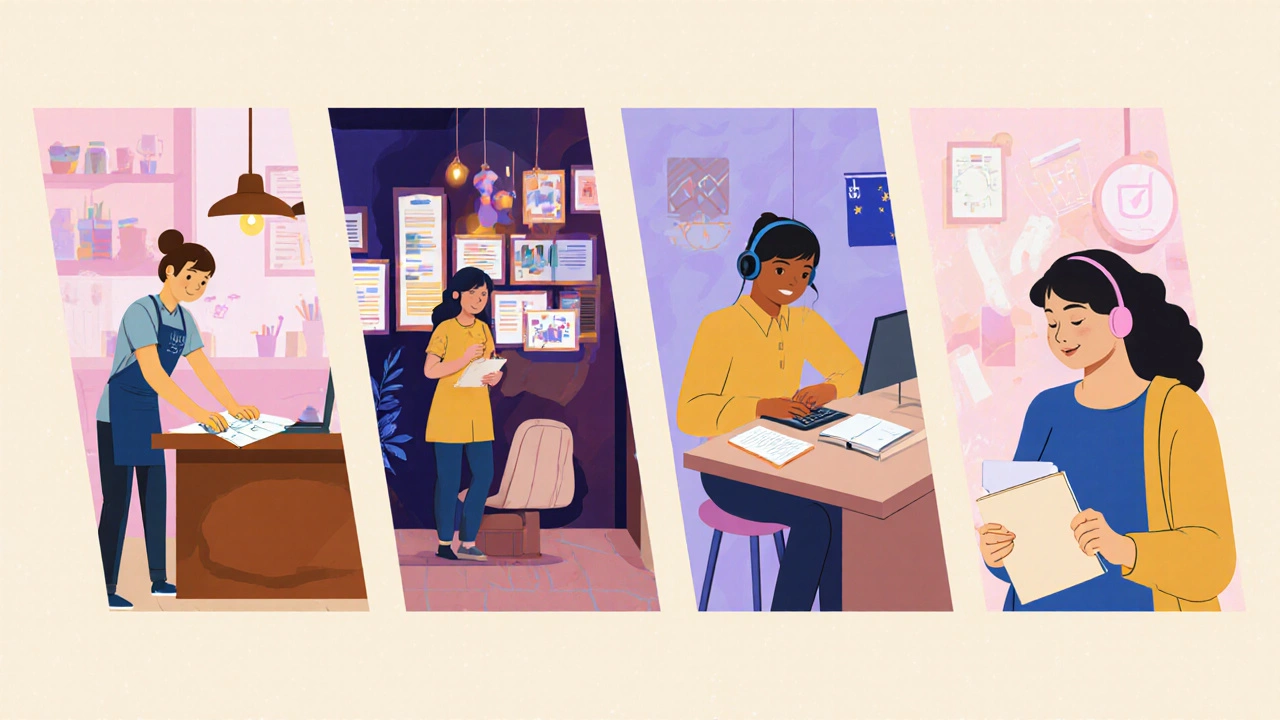Degree Difficulty Finder
Recommended Degree for You
Why it fits:
Top Matching Degrees
When you start hunting for a university program, the first question that pops up is often, “What degree is the easiest?” The answer isn’t a one‑size‑fits‑all label - it depends on your strengths, learning style, and career goals. This guide breaks down the most low‑stress degree options, the criteria that make a program easy, and practical tips to choose a path that suits you without burning out.
Key Takeaways
- Degrees with high credit‑hour flexibility, project‑based grading, and strong online support rank as the easiest.
- Typical “easy” choices include Bachelor of Arts in Humanities, Associate degrees in Business Administration, and certain online Bachelor of Science programs.
- Evaluate difficulty by looking at required core courses, assessment style, class size, and post‑graduation outcomes.
- Even an "easy" degree can lead to solid jobs if you pair it with internships, certifications, or a strong portfolio.
- Plan early, use campus resources, and keep a realistic GPA target to stay on the easy track.
How We Define "Easy" in a Degree
First, let’s set a clear definition. Degree is a formal academic qualification awarded by a college or university after completing a prescribed set of courses and credit hours. In this article, "easy" means a program that typically requires:
- Fewer mandatory STEM or quantitative courses.
- Assessment focused on essays, projects, or presentations rather than timed exams.
- Flexible scheduling options, including part‑time or fully online delivery.
- Lower average GPA thresholds for progression (often 2.5-2.7).
These criteria help us compare programs objectively rather than relying on vague reputation.
Top Low‑Stress Degree Options in 2025
Below are the most consistently easy‑to‑complete degrees, based on enrollment data from major Australian universities and student satisfaction surveys released in early 2025.
| Degree | Typical Credit Hours | Core Discipline | Assessment Style | Average GPA Required |
|---|---|---|---|---|
| Associate of Business Administration | 60 | Business | Projects, case studies | 2.5 |
| Bachelor of Arts - Communications | 180 | Humanities | Essays, presentations | 2.6 |
| Bachelor of Science - Information Systems (Online) | 180 | Applied Tech | Projects, labs | 2.7 |
| Bachelor of Social Work (Part‑time) | 180 | Social Sciences | Field work, reflective journals | 2.6 |
| Diploma of Early Childhood Education | 120 | Education | Practicum, portfolios | 2.5 |
These programs share the same four "easy" attributes: low‑math intensity, project‑oriented grading, flexible delivery, and moderate GPA expectations.

Why These Degrees Tend to Be Less Demanding
Three core reasons shape the ease factor:
- Curriculum Design: Humanities and business courses often emphasize reading, discussion, and written work over complex problem sets.
- Delivery Mode: Online and part‑time structures let students pace themselves, reducing the high‑pressure semester crunch.
- Student Support: Many institutions bundle tutoring, peer‑review forums, and automated grading tools for these programs, lowering the barrier to success.
For example, the University of Adelaide’s online Information Systems track uses an AI‑driven feedback system that grades code submissions within minutes, giving immediate guidance and cutting down anxiety.
How to Evaluate an "Easy" Degree for Your Situation
Even if a program checks the easy boxes, you still need to match it to your own profile. Use this checklist:
- Skill Alignment: Do you enjoy reading and writing more than calculations?
- Career Aspirations: Research entry‑level salaries and job growth for graduates. An "easy" degree that leads to dead‑end jobs may not be worth it.
- Accreditation: Verify that the program is accredited by the relevant Australian authority (e.g., TEQSA).
- Flexibility Needs: If you’re working full‑time, prioritize fully online or part‑time options.
- Support Services: Check for dedicated mentors, tutoring centers, and career counseling.
Applying the checklist narrows choices from a broad list to the few that truly fit your lifestyle and goals.
Real‑World Scenarios: When Choosing an Easy Degree Makes Sense
Scenario 1 - The Working Parent: Maya works evenings as a barista and wants a career shift. She enrolls in the Associate of Business Administration, studying two evenings a week. The credit‑hour load is modest, the assessments are case‑based, and she earns a 2.8 GPA, unlocking a junior admin role within six months.
Scenario 2 - The Recent Graduate Seeking a Fast‐Track: Liam already has a diploma in graphic design. He adds a Bachelor of Arts - Communications to broaden his portfolio. Because the program relies heavily on projects, he can blend his existing work into assignments, graduating in 2.5 years with a strong showcase for agencies.
Scenario 3 - The International Student on a Budget: Priya from India opts for an online Bachelor of Science - Information Systems. Tuition per credit hour is lower than on‑campus rates, and the flexibility allows her to work part‑time in Adelaide, keeping living costs manageable while still earning a recognised degree.
These stories illustrate that an easy degree can be a strategic move when paired with clear career intent and personal circumstances.
Potential Pitfalls and How to Avoid Them
Choosing the "easiest" option isn’t risk‑free. Common issues include:
- Underestimating Workload: Even project‑heavy courses require consistent effort. Set weekly milestones.
- Lack of Depth: Some employers view certain easy degrees as less rigorous. Counter this with certifications (e.g., Google Analytics for Business Admin) or a strong internship.
- Limited Transferability: Credits from highly specialized diplomas might not transfer to a full bachelor’s later. Verify articulation agreements early.
Mitigation strategies are simple: create a study schedule, supplement your degree with industry‑relevant short courses, and keep an eye on credit transfer policies.
Beyond the Degree: Building a Marketable Profile
Regardless of how easy the program is, employability hinges on what you do outside the classroom. Here are three proven actions:
- Internships or Volunteering: One semester of real‑world experience often outweighs a higher GPA.
- Professional Certifications: For business students, a Certified Associate in Project Management (CAPM) adds credibility.
- Portfolio Development: Compile projects, case studies, and reflective journals into an online showcase.
Combining these with an easy degree can produce a resume that’s both polished and realistic.
Quick Decision Tree - Is This The Right Easy Degree for You?
Use the flowchart below to self‑assess:
- Do you prefer writing over calculations?
- Yes → Proceed.
- No → Consider STEM‑light options like Information Systems.
- Can you study primarily online or part‑time?
- Yes → Look at online Bachelor programs.
- No → Choose campus‑based Associate degrees with flexible timetables.
- Is your career goal entry‑level admin, communications, or social work?
- Yes → The listed easy degrees match well.
- No → Research specialized programs with higher difficulty but better alignment.
Answering “yes” to at least two steps suggests a good fit for an easy degree path.
Frequently Asked Questions
Which degree requires the fewest credit hours?
Typically, an Associate degree in Business Administration or a Diploma in Early Childhood Education requires around 60-120 credit hours, making it the quickest path to a qualification.
Can an easy degree lead to a high‑paying job?
Yes, especially when you add relevant certifications or internships. For example, a BA in Communications combined with a digital marketing certificate can lead to roles paying AU$70,000-$85,000.
Is online learning as reputable as on‑campus study?
Accredited online programs are recognized equally by employers and government bodies, provided the institution holds TEQSA accreditation.
What GPA should I aim for in an easy degree?
A GPA of 2.5-2.7 is usually sufficient to stay on track and graduate without academic probation.
Do easy degrees have good graduate outcomes?
Graduate surveys from 2024‑2025 show that 68% of Associate Business Administration graduates find employment within six months, and 55% of BA Communications graduates secure entry‑level roles in media or marketing.
